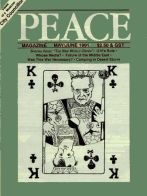
Peace Magazine May-Jun 1991, page 15. Some rights reserved.
Search for other articles by Thom Workman here
A transparent peace characterized by the restoration of interstate "balance and order" is slowly settling over the Gulf. The situation corresponds closely to the idea of negative peace popularized by Johan Galtung in the 1960s. The cauldron of social injustice continues to boil. How long will this "peace" last? What role can third parties or conflict managers play in the evolving peace process?
In its narrower meaning, conflict management refers to procedures aimed at reducing military hostility and overt violence, without necessarily resolving conflict. Emphasis lies with keeping the use of military force and violence to a minimum. In this sense conflict management means conflict suppression.
But in its broader sense conflict management refers to certain procedures and instruments can be used to permanently resolve conflicts. The interventions by third parties address those underlying issues which sustain violent conflict. This type of conflict management is similar to conflict resolution[1]. It rests on the assumption that a lasting peace must be premised on social justice, as in Johan Galtung's notion of positive peace.
This broader view of conflict management must guide any third party intervention in the Persian Gulf. In the Gulf societies, small groups benefit and larger groups remain disenfranchised and disempowered.
Only the ruling elites, their clans and small capitalist classes have truly benefitted from oil riches and "development" in the region. Ethnic groups throughout the region, such as the Kurds, the Turkomans and the Baluchis, are deprived of basic rights to self-determination. Religious minorities, such as the Shi'a in Saudi Arabia are persecuted. The urban working classes are rarely allowed to act collectively. In Saudi Arabia after the Mecca rebellion of 1979 the oppressive cultural code regarding women has been vigorously reinforced in accordance with the demands of the extreme Wahhabi sect that forms a cornerstone of the Saudi regime.
The social and political conditions of ethnic minorities, the rural masses, the working classes and the urban poor have progressively worsened. Normal avenues of political expression are closed to these constituencies.
In this repressive atmosphere political violence takes an internal and an external path. The internal path involves acts of violence directly against the state by groups opposed to current social and political arrangements. The struggle of the Kurdish, Baluchi, Turkomani, Qashqa'i, Luri and Bakhtyari ethnic and tribal groups, the struggle of Shi'i opposition groups in both Iraq and Saudi Arabia, and the struggle of left-wing opposition groups in all the Gulf states have followed this course. Many struggles, especially those of the Kurdish groups in Iraq (the Kurdish Democratic Party, the Patriotic Union of Kurdistan and the Komaleh) and Iran (the Iranian Kurdish Democratic Party and the Komaleh) have the character of civil wars.
Military force is frequently employed against internal populations, especially in Iran, Iraq and Saudi Arabia. In Iran, for example, the rise of the Revolutionary Guards was directly related to the need to put down revolts among Iran's numerous ethnic and tribal minorities. Iraq's armed forces have frequently been used against Kurdish groups.
The instability of the Gulf societies is also related to the use of military force against neighboring states. Warfare can create unity in otherwise hopelessly divided societies. For example, the Ba'ath regime in Iraq adroitly portrayed the Iran-Iraq war as an Arab struggle against the Persians. This characterization of the war was designed to temporarily overcome the deep class and racial divisions. Warfare can also provide the ruling regimes with a blanket pretext for removing internal dissent.
The waging of war can also secure specific political goals necessary for the maintenance of the ruling regimes. Iraqi efforts to secure oil revenues in 1980 when it invaded Iran and again in 1990 when it invaded Kuwait are testimony to this role of war.
Only by directly addressing the underlying social conflicts that give rise to interstate rivalry and aggression throughout the Gulf can lasting peace be achieved. If a new international order is emerging it must be premised on more than interstate balance and order. The international community must orient its policy towards the repression that characterizes the region.
This process must go well beyond the U.S. initiative to "address" the Palestinian issue. The world must view the Gulf region as more than a dumping ground for its armaments or as a supplier of crude oil. The following conflict management process must be closely followed by the international community:
Ethnic minorities must be given the right to self-determination; women's groups must be allowed to organize and develop; the working classes must be allowed to act collectively; religious persecution must cease, and the misery of the urban poor must be effectively addressed. The gradual dismantling of the repressive police states will lessen the likelihood that the Gulf states will resort to war in the future.
Thom Workman is a Research Associate at the York Centre for International and Strategic Studies.
1 Chris Mitchell, "Conflict, War and Conflict Management" in International Relations: A Handbook of Current Theory, eds., Margot Light & A. I. R. Gronm, Lynne Reinner Publishers, Inc., 1985), pp.128-129.

Peace Magazine May-Jun 1991, page 15. Some rights reserved.
Search for other articles by Thom Workman here